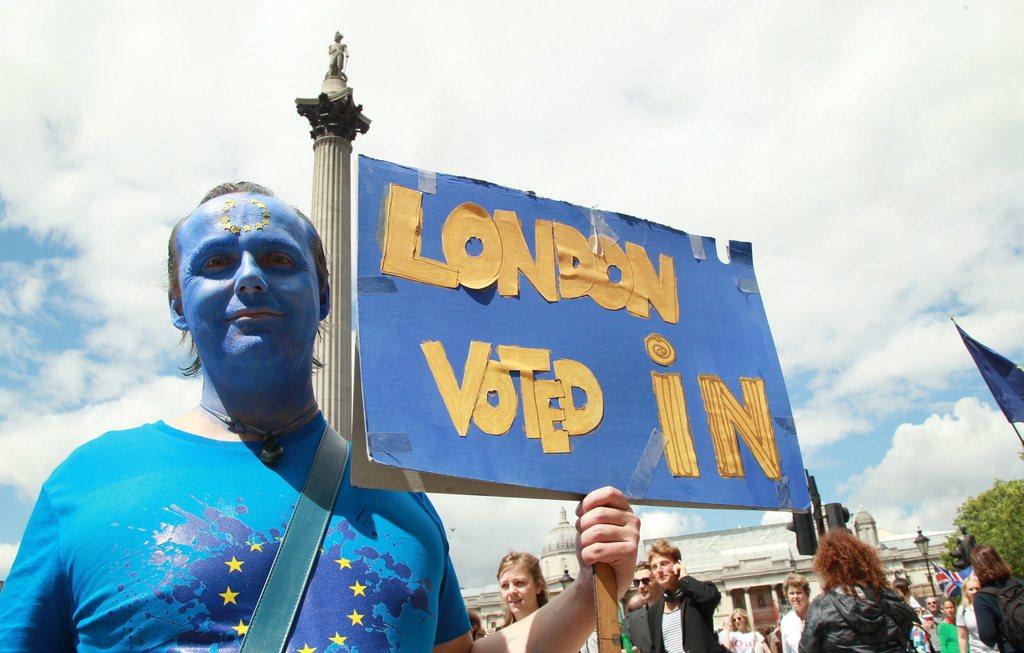
Brexit and the Swiss connection – a guide

Following the decision by British voters on June 23 to take their country out of the European Union, Swiss politicians and the media are trying to work out what the vote to leave will mean for them. Here, swissinfo.ch explains a tortuous tale of three cities.
What’s the immediate effect of Brexit for Switzerland?
Well, Switzerland will be the least of Brussels’ worries for several years while Brussels and London negotiate their divorce. For his part, Economics Minister Johann Schneider-Ammann, who holds the rotating Swiss presidency this year, said with considerable understatement: “Brexit would hardly strengthen stability in Europe, which in turn would have an effect on Switzerland.”
To be honest, no one knows what will happen. No member state has ever left the EU and everything depends on how bitter and drawn-out the post-Brexit divorce negotiations are.
A lot of questions and not many answers…
The Swiss foreign ministry has set up a helpline for Swiss citizens and businesses wanting to know what Brexit could mean for them: 0800 247 365 in Switzerland (free) and 0041 800 247 365 from abroad (fee).
Switzerland isn’t a member of the European Union. Why does it care about Brexit?
The short answer is that the Swiss cabinet is pressed for time to reach an agreement with the EU on curbing immigration, and Brussels has said it won’t turn its attention to Bern before sorting out London.

More
Brexit: should expats in Switzerland be worried?
The long answer?
It all goes back to February 9, 2014, when 50.3% of Swiss voters approved an initiative by the rightwing Swiss People’s Party to impose limits on the number of workers allowed into Switzerland from EU and EFTAExternal link countries. Parliament then had three years to implement this – in other words, by February 9, 2017.
The problem, as Brussels was quick to point out, is that curbing immigration in Switzerland would violate an agreement on the free movement of peopleExternal link, one of the EU’s central tenets that Switzerland signed on to in 2002 as part of a package of bilateral accords.
The Swiss cabinet thus found itself in the seemingly impossible position of implementing an initiative that demands limits on free movement while not jeopardising bilateral accords with the EU.
What was the cabinet’s solution?
It’s still working on it. But on March 4, the Swiss cabinet proposed a so-called unilateral safeguard clause to curb immigration that would take effect in 2017 if it couldn’t reach an agreement with the EU on limiting influxes of foreigners. Under the proposal to be submitted to parliament, Switzerland would claim the right to limit free access to the Swiss labour market due to serious economic or social problems.
On the same day, the cabinet announced it had agreed to a treaty with Brussels that would extend the accord on the free movement of people to Croatia.
It plans to curb immigration and extend the free movement of people at the same time?
It’s a kind of magic. Two days later, Foreign Minister Didier Burkhalter responded to criticism that the cabinet was sending mixed signals on Europe: “We are simply saying to the EU that with a bit of pragmatism and imagination, problems can be solved in steps. The signature of the protocol is one that brings us closer to the goal of better management of migration to Switzerland, while also preserving and developing the bilateral approach.”

More
Would the Swiss model suit a post-Brexit Britain?
What did Brussels make of that?
Not much. It’s standing firm that it won’t accept any limits to the free movement of people. Indeed no one, apart from the People’s Party, is keen on the unilateral option. Not least because it violates free movement and the situation is unclear regarding almost 300,000 cross-border workers. Swiss companies would suddenly have staffing problems and many EU workers living near the Swiss border would lose their jobs (in Switzerland). Brussels would definitely not be amused and would probably think up some unpleasant countermeasures.
In February, as part of negotiations with British Prime Minister David Cameron, the EU agreed to a sort of safeguard clause for Britain. What are the chances of it agreeing a similar one with Switzerland?
This is the big question, and it doesn’t appear that the chances are very good. Burkhalter himself admitted there was “no direct link” between the solution proposed in LondonExternal link and the talks conducted by Switzerland following the 2014 immigration vote.
While London is seeking to curb benefits for immigrants, Switzerland wants to re-introduce quotas for those coming from the 28-nation bloc as well as Norway, Iceland and Liechtenstein. “It doesn’t mean a general solution agreed [with Britain] is also a solution for Switzerland,” he said on February 2.
He also pointed out that the status of the two countries was totally different. “We’re not a member of the EU and we don’t want to become one, while Britain is a member and is debating whether it should remain one.”
Brussels is concerned that reaching a deal with non-member Switzerland – especially if it involves some sort of safeguard clause – could give some member states ideas.
Economics Minister Johann Schneider-Ammann, who holds the rotating Swiss presidency this year, confirmed on February 4 he had “received indications that Switzerland could rejoin the table [to relaunch talks with Brussels] as soon as the main agreement is concluded between Britain and the EU”.
Which will now take years, so a unilateral curb on immigration in February is the most likely outcome?
That’s what it looks like.

More
Switzerland’s special EU deal

In compliance with the JTI standards
More: SWI swissinfo.ch certified by the Journalism Trust Initiative
















![The four-metre-long painting "Sonntag der Bergbauern" [Sunday of the Mountain Farmers, 1923-24/26] had to be removed by a crane from the German Chancellery in Berlin for the exhibition in Bern.](https://www.swissinfo.ch/content/wp-content/uploads/sites/13/2025/12/01_Pressebild_KirchnerxKirchner.jpg?ver=cb688ed5)















You can find an overview of ongoing debates with our journalists here . Please join us!
If you want to start a conversation about a topic raised in this article or want to report factual errors, email us at english@swissinfo.ch.